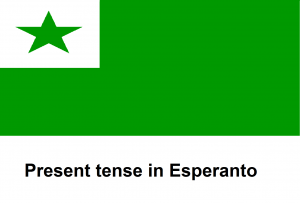Language/Esperanto/Grammar/Present-Tense
Jump to navigation
Jump to search
Rate this lesson:
.
Hello everybody,
In today's lesson you will learn some useful vocabulary about ¨PRESENT TENSE¨ in Esperanto.
Feel free to edit this page by adding new words and expressions !
Good learning ! :)
.
.
Some explanation for Past tense in Esperanto[edit|edit source]
OBS.: In the infinitive form; change the last letter (-i) by (-is) to form the Past Tense
| ENGLISH | PRONUNCIATION
ENGLISH |
ESPERANTO | PRONUNCIATION
BRAZILIAN PORTUGUESE |
BRAZILIAN
PORTUGUESE |
|---|---|---|---|---|
| to have | hah vih | havi | ter | |
| I had | mih hav vihs | Mi havis | mi Ha vis | Eu tinha |
| You had | vih hav vihs | Vi havis | vi Ha vis | Você tinha |
| He had | lih hav vihs | Li havis | li Ha vis | Ele tinha |
| She had | shih hav vihs | Ŝi havis | chi Ha vis | Ela teve |
| We had | nih hav vihs | Ni havis | ni Ha vis | Nós tínhamos |
| You had | vih hav vihs | Vi havis | vi Ha vis | Vocês tinham |
| They had | ih lih hav vihs | Ili havis | ili Ha vis | Eles tinham |
| I came | mih veh nihs | Mi venis | mi ve nis | Eu vim |
| I ate an egg | mih mahn jihs oh vohn | Mi manĝis ovon | mi man djis o von | Eu comi um ovo |
In Esperanto, expressing present tense is changing the "-i" of a verb to "-as".
- I come. - Mi venas.
- I eat an egg - Mi manĝas ovon.

